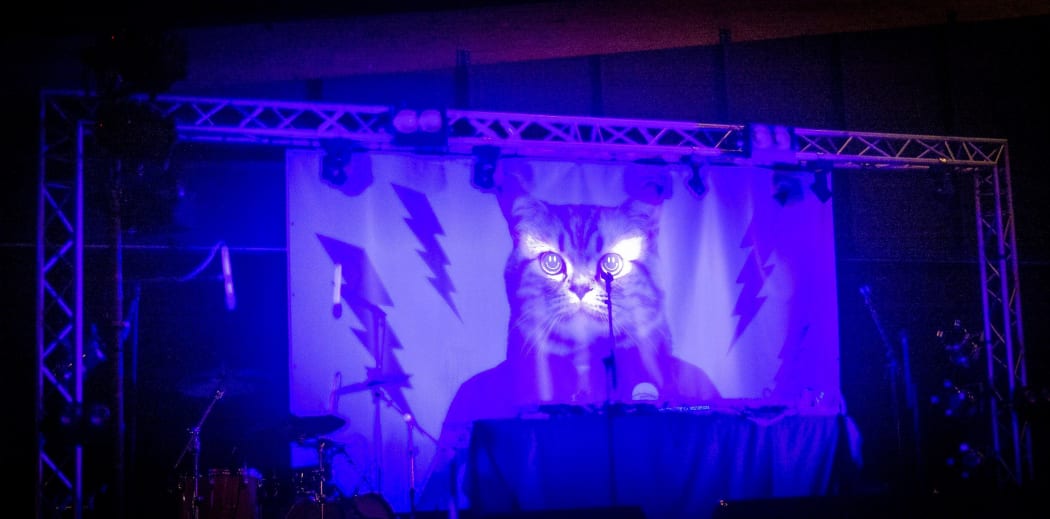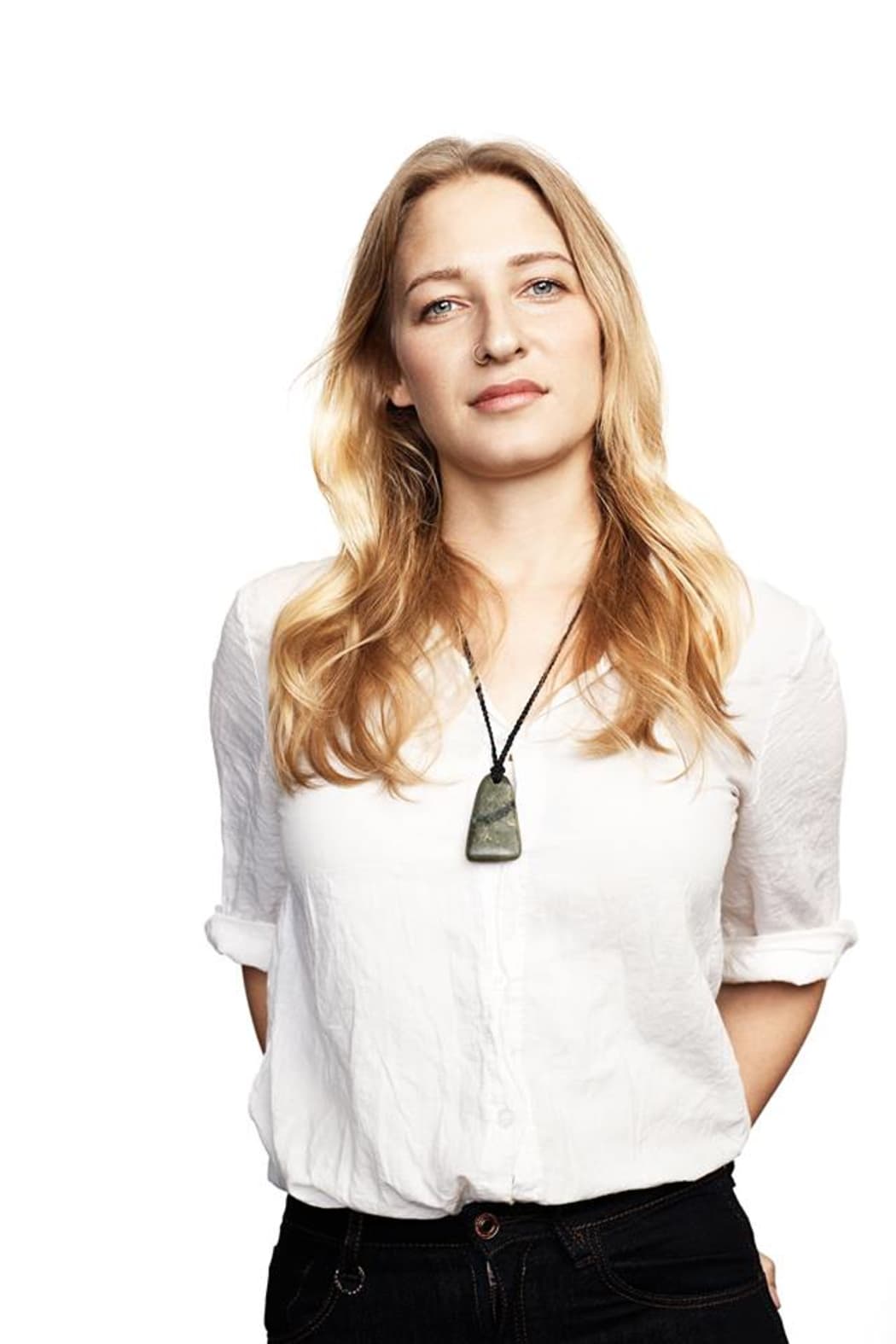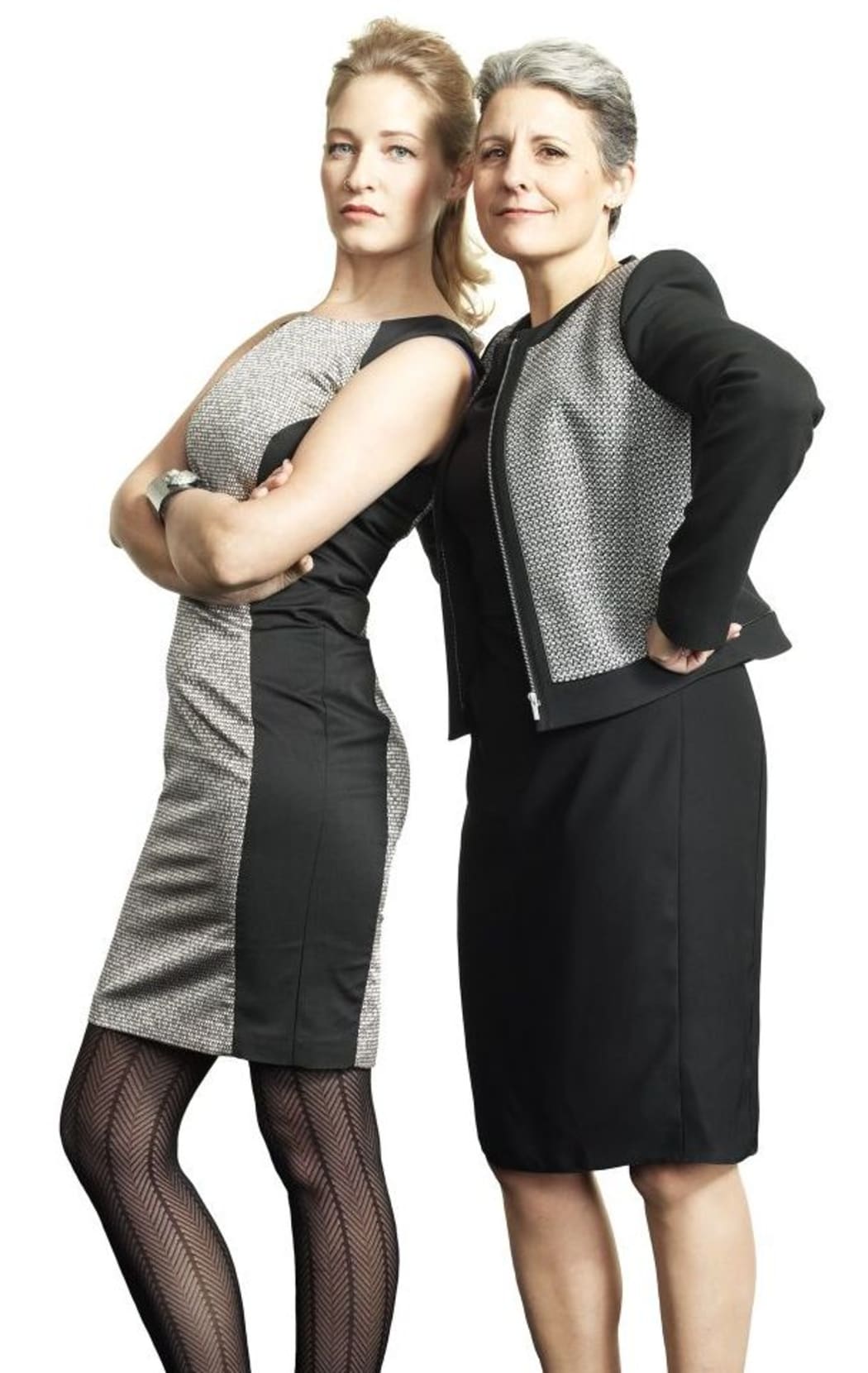With the general election just a month away, whose are the fresh faces in politics? As part of a series of profiles of first-time candidates under 35, The Wireless producer Elle Hunt talks to Miriam Pierard of the Internet Party.
Like all venues that put music before booze, the James Cabaret – on the fringe of Mt Victoria, a block over from KFC – has a sort of strait-laced, no-frills functionality to it. In the absence of windows, let alone any décor of note, the performers take precedence against the dark red drapes to colour the evening.
This cold, wet night in July, the tone is set by cats wearing superhero capes, shooting lasers from their eyes, and pop-art portraits of cows. Why cats? Why cows? Why are there two people, apparently in positions of authority, wearing animal onesies?

The Internet Party Party Photo: Facebook
But I should know better than to ask ‘why’ of the Internet Party’s brand strategy, which seems to combine a broad understanding of both meme culture and antidisestablishmentarianism for no more concrete a reason than ‘it’s yoof, innit’. I’m not sure what I was expecting of its ‘Party Party’, a nationwide concert tour to remind the younger generation of its democratic rights through the medium of drum’n’bass – but it wasn’t this.
The as-yet sparse crowd is just as hard to make sense of. A few I recognise as parliamentary staffers, but others look like part of the middle-aged, middle-class arts festival set. There are relatively few of the fabled ‘young people’ who are disengaged from the system; who abstain, consciously or otherwise, from voting in their masses; whose interests the Internet Party say it will represent this election and beyond.
But it’s only 10pm. The headliner, State of Mind, isn’t due on for another three hours.
When there were first rumblings of Kim Dotcom’s party at the end of last year, no one knew what to make of them – of this larger-than-life character moving towards a more prominent role in politics than the one he’d had behind the scenes for far longer than many had realised. The response, or that which the rumour was dignified with, could be summed up in one word: ‘What?’
Herald journalist David Fisher, the author of The Secret Life of Kim Dotcom, recently told the Guardian that he “didn’t think much” of Dotcom’s political aspirations: “You know, he sits in the gold mansion and comes up with ideas and I didn’t take it seriously.”
With voter turnout at a record low, it aims to engage with young people on their terms, which is to say, lolcats, dance music, and repeated use of the word ‘awesome’
But today, it’s hard to remember a time when Dotcom was more punchline than headline. No matter what you think of the Internet Party, it’s gained remarkable momentum in fewer than six months – and for a movement positioned in the digital space, it’s covered a lot of ground. It threw four ambitious ‘Party Party’s in as many days, and its nationwide roadshow with Mana wraps up in Tauranga at the end of this month. Online engagement is no match for that ‘IRL’ in an election party.
But its web focus has been ambiguously articulated beyond its policies for cheaper, better access and greater freedom – and what political group isn’t, to more or less effective ends, an ‘internet party’ in this digital age? More obvious is its focus on bringing first-time voters and 20-somethings into the political process. With voter turnout at a record low, it aims to engage with young people on their terms, which is to say, lolcats, dance music, and repeated use of the word ‘awesome’.
Matthew Beveridge, who has been blogging about political parties’ social media presences this election, says the Internet Party is “in some ways … very sophisticated and well thought-out” – and in others, spectacularly not. He points to a much-criticised tweet parodying Picasso’s Guernica sans historical context (which the party later attributed to “remix culture”), and a snarky reply to national treasure Dan Carter.
“I’m not sure about the whole cat thing,” Beveridge admits over email. “I kinda get the feeling that they’re trying to hook into a bunch of memes that will attract attention with younger people. … Their branding and PR is focused on the whole anti-establishment, fun aspect.”
And that can come at the cost of messaging. Tonight’s musical billing is impressive, but by no means does it make for a cohesive political statement, even one as straightforward as ‘We don’t care who you vote for, as long as you vote!’
The only reference to politics so far, apart from a few awkward reminders to enrol as segues between songs, has come care of Wellington rapper Tommy Ill, who has revised the lyrics for his upbeat paper-chasing anthem ‘New Car Money’. The chant “I want that Dotcom money” is on the nose, even for an act that one punter present mistakes for the Telecom ‘Giganaire’.
Only the political journalists, keen to get their sound bite and go home, are agitating for the advertised “special guest appearance” from Dotcom (“I’m mega-excited to be joining this awesome lineup! Let’s Party!”). He’s just visible in the curtained-off VIP area on the mezzanine floor above us, sitting on a couch, wearing a baseball cap backwards, all but motionless but for the gentle nodding of his head.
I’ve been here 40 minutes. Ready when you are, I text my ride.
*
A fortnight earlier, I was at a café with Miriam Pierard, third on the Internet Party list, giving her the spiel about my profiles of “the new faces in politics”. I tell her I’d intended to interview just three major parties’ first-time candidates under 35 – but then the Internet Party happened.

Miriam Pierard of the Internet Party Photo: Charles Howells
Pierard, 28, nods. “And of course that’s most of us,” she says.
In the language of junk science that’s nonetheless close to my heart, it’s at once clear that she’s ‘Feeling’, and probably extroverted. She talks a lot, and very fast – for two minutes straight, actually, about her job, how young people are disengaged from politics and the various reasons that might be, what she sees as token efforts to get them onside and how the Internet Party is different, all in response to my incisive first question “So you’re a social sciences teacher?”
It was teaching social sciences at St Cuthbert’s College, a decile-ten private secondary school in Auckland, that she became aware of the full extent of the younger generation’s unharnessed potential. It grates on her that it’s chalked up to apathy and laziness when “the system is set up to exclude them”, she says: “They’re so much more onto it than people give them credit for, and it’s no wonder that they’re not voting if they’re left out of that conversation.”
Pierard herself “became politicised” aged 11, listening to Bomber Bradbury’s talkback show on Channel Z. She remembers walking to school with her best friend one morning and “saying something along the lines of ‘sink the Ship’”, in reference to Jenny Shipley’s National Government.
“My friend said, ‘We’re too young to talk about politics’. I said, ‘What? Who told you that?’ I remember feeling so angry and frustrated about that, thinking, ‘How come, that’s ridiculous – if we know about it, why can’t we talk about it?’”
She’s held onto that earnestness and that activism, setting up a peace group to protest the American invasion of Iraq in her final year at Epsom Girls’ Grammar, and joining Students for Justice in Palestine as a student at Auckland University. In 2012, she was a spokesperson for the Aotearoa is Not for Sale campaign against the partial privatisation of state-owned assets.
Though she volunteered with the Greens, helping out with her friend Julie Anne Genter’s Epsom campaign, she was never drawn to a career in politics in part because of the pettiness of the parliamentary process. It’s like “this big fight in a sandpit”, she says, with no cross-party collaboration or action on the issues that she thinks will come to define this generation, things like climate change and inequality.
“It turns very quickly to personal attacks, and I hate that, and I know a lot of young people are thinking the same thing,” she says. “When you watch Question Time, you see what these politicians are like, and I don’t want that for myself.”
LISTEN to Pierard’s interview with Sunday Mornings host Wallace Chapman:
She lists with increasing fervour examples of what she sees as the Government’s disingenuousness, and its disregard for the average New Zealander: its failure to insulate 30 per cent of state houses; its selective approach to research on class sizes; senior ministers’ response to David Cunliffe’s commitment to addressing domestic violence, the topic du jour at the time of our interview.
“I just see a lot of promises, and a lot of promises broken,” she says. “It really saddens me that we’ve got these politicians in power who feel like we don’t matter. … It’s really arrogant and dismissive.”
In 2013, she took a year out from teaching to see how other parts of the world approached politics. She travelled to Iceland to meet with Reykjavík mayor Jón Gnarr, a former comedian who rose to power with ‘the Best Party’ (“I don’t know if I like the word ‘idolise’, but if I was going to idolise anyone…”), and spent a period living in the Bolivian jungle “with pumas”.
When she returned to New Zealand in January, she admits she had “a bit of a laugh” about Dotcom’s political aspirations. But in early April, she met a group of young men wearing Internet Party T-shirts at a rally against the Trans-Pacific Partnership. “A lot of them said things like ‘I’ve never really been interested in politics, but the Internet Party really speaks my language’, and they were able to articulate a lot of the problems [with the TPP]. … I was blown away. I thought ‘This is definitely a party to watch’.”
The alliance with Mana, of which she’s a member, further piqued her interest: she saw it as an expression of willingness, on the parts of two quite different groups, to work together in achieving a common goal.
But she was eventually moved to stand for the Internet Party because of what she saw as the first genuine moves to empower and engage with young people. At the Electoral Commission’s workshop on “rocking the youth vote” in Wellington at the end of May, she realised she could use a political platform to amplify the same message as organisations like RockEnrol about increasing access to democracy.
“I don’t buy that argument you can’t work inside the system,” she says. “I think we should take every action, however we can, and we need to have people working inside and out of it.”
Plus, she saw the Internet Party’s newness – from its live-streamed, Idol-esque approach to candidate selection, to its use of the online decision-making tool Loomio and Google Documents to form policy – as liberating. “We don’t have any baggage – we’re so new, we can do what we like. We can ask the hard questions, because we’re not tied into a more conservative bloc. … I think it’s revolutionary. I can see myself in it, because I feel I can be myself in it.”

Miriam Pierard and Laila Harre of the Internet Party Photo: Charles Howells
Even for an F, she’s incredibly passionate – at various points in our interview “saddened”, “proud”, “frustrated”, even “sick at the thought of [National] getting in again” – and she seems to make no attempt to tone it down or self-censor. It’s sort of refreshing after the slogans, catchcries, mudslinging and hot air we expect (though Pierard would argue we shouldn’t have to) in an election year.
They say people need a little bit of religion to get religion – it’s the same with passion, and hers is contagious. Even though, as a journalist, I have no thoughts or opinions of any kind, after 45 minutes in her company, I can’t help but feel a little more earnest, a little more outraged. The kind of mood that I imagine moves people to share political memes on Facebook.
“People have criticised me since I was a teenager, saying ‘You’re so idealistic, you just want to have peace’, and it’s like, ‘Well, why shouldn’t I be?’” Pierard says – and though it’s a rhetorical question I can’t think of a reason why not. “Sure, there are complicated obstacles but let’s make a commitment to get there together, or at least to try to.”
I ask how she thinks that idealism will fly in Parliament.
Without missing a beat, she says, “We’ll find out.”
*
I’m long gone by the time Kim Dotcom takes the stage at the Party Party, but by all accounts, his three-minute address was underwhelming, culminating in his go-to “F… John Key” chant and a Chief Keef cover. (Among that shit Kim don’t like: “the National Party”, “John Key”, “extradition treaties”, “copyright law”.)
But while the journalists might have been unimpressed, the Party Party wasn’t for them. The crowd seemed to lap it up.
Cover image from Facebook.

